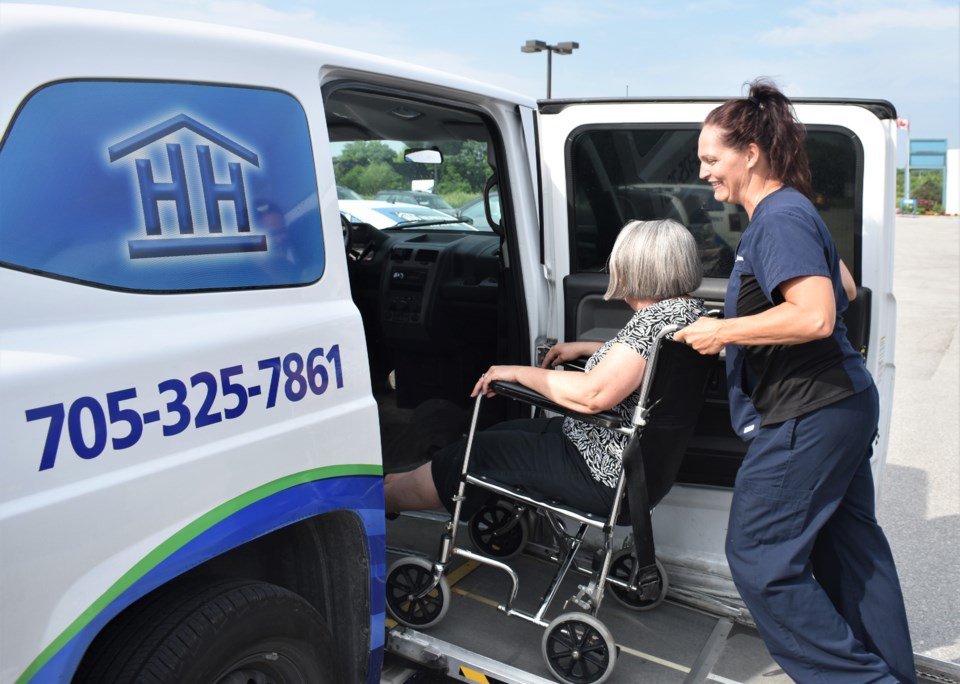Organizations like Orillia’s Helping Hands are looking for more support from the province to help address staffing and other concerns in the home and community care sector.
Helping Hands is one of more than 220 not-for-profit member organizations of the Ontario Community Support Association (OCSA) that provide care for people in their homes and communities in an effort to help them live independently.
OCSA CEO Deborah Simon said recruiting and retaining staff has been a struggle, particularly during the COVID-19 pandemic. She noted there has been a decrease of thousands of staff, including nurses and personal support workers (PSWs).
“We’re competing for the front-line staff in the home and community care sector, but we don’t have the resources to attract people to the sector,” she said.
A big part of the challenge is wages, Simon said, noting PSWs working in home and community care make about 19 per cent less per hour than those working in hospitals.
The OCSA wants wage parity across the health-care sector.
“We absolutely need to shore up those salaries,” she said.
It would be a worthwhile investment, she added, because keeping people in their homes takes pressure off of other operations such as hospitals.
“An investment in home and community care is really cost effective compared with being in a long-term care bed or an acute care facility, and it’s what Ontarians want,” she said. “We’re at a very critical juncture where we’re looking for government to step up for our sector.”
Helping Hands Orillia CEO Shelley Cameron feels the same way.
“If we’re not funding that community sector properly, we’re burdening the health-care sector,” she said. “If we’re not receiving the appropriate funding, we’re unable to keep people independent and in their homes.”
Some of the services provided by Helping Hands, which serves more than 1,700 clients in the region and has about 45 active staff members, have been affected during the pandemic.
“COVID has been very difficult on everyone and, unfortunately, with staffing shortages, we don’t have the capacity that we did pre-COVID,” Cameron said. “We’re doing everything we can to ensure that we’re able to serve our clients. They have been very patient and we’re grateful for that.”
In some cases, home visits have been cut short to allow Helping Hands to tend to as many clients as possible.
Cheryl Veltkamp’s family has years of experience with Helping Hands. They first used its services in 2010, when her father was diagnosed with terminal cancer.
Her mother was diagnosed with Alzheimer’s disease in 2017 and she benefits from the care of Helping Hands PSWs, who help with everything from cleaning and meal preparation to personal care and supervision when taking medication.
Veltkamp’s mother also gets transportation from Helping Hands so she can get to and from the VON Day Program.
“These programs have been a godsend for our family. They have allowed my mother to keep her independence and stay in her own home at the ripe age of 92,” Veltkamp said. “Without Helping Hands and VON, I would not be able to continue working and my mother would not have been able to keep her independence as long as she has.”
It hasn’t been easy over the past couple of years, though.
“The pandemic has greatly affected my mother’s care,” she said. “Before the pandemic, my mother had basically the same two PSWs all the time. However, during the pandemic, her schedule has been disrupted by staff shortages and rearrangements in schedules, which, for someone with Alzheimer’s, is very disruptive and stressful.”
Like the OCSA and Helping Hands, Veltkamp wants to see more PSWs hired so clients can have the same ones on a regular basis. She also wants to see PSWs and volunteer drivers receive additional training for working with clients with Alzheimer’s.
Her family’s experience is one of many, as OCSA member organizations provide support to more than one million people.
Simcoe North MPP Jill Dunlop was not available for an interview, but she said in a statement, “the Ontario government values personal support workers and the integral role they play in Ontario's health-care system, including their contributions to ensuring that Ontarians have access to the home care services they need.”
She noted the province’s annual support for home care totalled $3.08 billion in 2020-21 and that it announced additional investments of $548.5 million over three years for post-acute surgical patients and those with complex health conditions.
The fall economic statement also included $342 million to hire more than 5,000 nurses and 8,000 PSWs.
“This is in addition to more than $120 million invested in incremental funding for home and community care,” she said.
She pointed to the province’s $1.3-billion investment “to temporarily enhance wages for personal support workers and direct support workers to help stabilize, attract and retain the workforce needed to provide a high level of care during the pandemic.
“This includes an estimated 38,000 workers in the home and community care sector. The government continues to explore a permanent solution with respect to wages to address a range of long-standing recruitment and retention issues among personal support workers and direct support workers.”
The OCSA appreciated the money for home care, Simon said, but added there needs to be more than temporary wage support for PSWs, who are “the backbone of our sector.”
